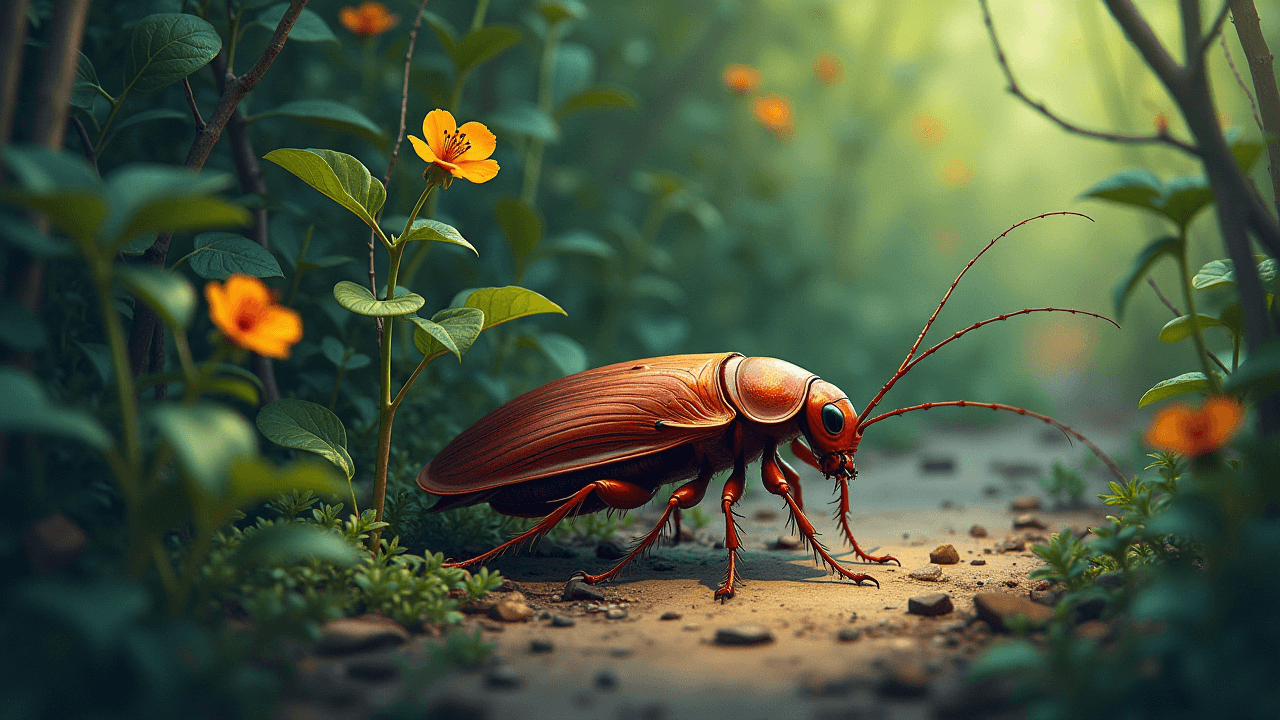Right, so cockroaches. Everyone knows them—those little creatures that send shivers down your spine when they scurry out from under the fridge. We’ve all been there. But here’s a question that got me thinking: Why don’t we see them more in gardens or forests, you know, out in nature? They always seem so tough, like they could survive anywhere.
The Question: Where Are the Cockroaches in Nature?
It’s a really interesting question. It shows how our experience with them inside kind of colors how we think about them as a whole species. We see them as these hardy invaders in our kitchens, but that’s because we’re usually too busy trying to get rid of them to actually think about their place in the grand scheme of things.
Predators: Nature’s Way of Keeping Cockroaches in Check
So, why aren’t our gardens just completely overrun with these seemingly invincible insects? Predators might be a big factor. Absolutely, out in the wild, cockroaches are basically walking snacks for all kinds of predators. Birds, reptiles—think about those geckos you see in tropical areas—and amphibians all eat cockroaches. And then you’ve got things like parasitic wasps that specifically target cockroach eggs.
Nature has its ways. It’s got some pretty wild methods of keeping those populations in check. Parasitic wasps—that’s intense! But, you know, you walk into your average apartment, and suddenly those predators are nowhere to be found. It’s like we’ve accidentally laid out the welcome mat.
The Ecological Niche of Cockroaches in Our Homes
Exactly. And that’s where this whole idea of an ecological niche comes in. Human homes, with all the food lying around, stable temperatures, and most importantly, the lack of natural predators—it all adds up to a really ideal habitat for certain cockroach species. It’s like a safe haven, almost.
Someone once made this comparison that really resonated with me: modern cities are basically like giant pigeon cliffs. They both offer that same kind of protection from predators, and it makes them really attractive to certain species. It’s like we’ve recreated those conditions, even if we didn’t mean to. Right inside our own walls, we’ve become accidental landlords.
Adaptation: Why Some Cockroaches Thrive Indoors
That’s a great analogy. And just like pigeons have adapted to city life, some cockroach species have really thrived in these human-made environments. But it’s not just about avoiding predators, is it? It’s all about location, location, location, as they say.
Yeah, it’s not just about finding a place where no one’s gonna eat you. There’s also competition in the wild, which I don’t think about too much when I’m trying to evict one from my kitchen.
The Role of Cockroaches in the Ecosystem
For sure. I mean, just think about it. Gardens and forests are already jam-packed with insects, right? And they’re all competing for the same resources. It’s not like cockroaches have some kind of guaranteed meal ticket out in the wild, like they might find in your pantry.
It’s a jungle out there—literally, in some cases. We always say “gardens and forests,” but even those are so different from each other. That’s a really important point, and it kind of brings us to adaptation. There are thousands and thousands of cockroach species in the world, but it’s only a handful that really do well in human environments.
Cockroaches as Nature’s Cleanup Crew
Take the German cockroach, for example. Those guys are masters of adapting to our homes. They’ve evolved to prefer the stuff we eat, the temperatures we like, even just the way we design our living spaces. You’re not gonna find them roughing it out in the woods, you know what I mean?
It’s kind of wild how they seem like simple creatures, but they’ve got these really specific strategies to survive, and we forget that. Even the ones we call pests—the ones we’re always battling with traps and sprays and stuff—they’re still part of the bigger picture.
Absolutely, and they’re playing a vital role in that picture, even if it’s not the most glamorous job. Speaking of which, someone once said that cockroaches are like tiny garbage men. Not the first thing that comes to mind, really.
But it makes sense when you think about it. It kind of perfectly sums up this role they play that we often completely overlook. They’re detritivores—basically nature’s cleanup crew. They break down organic matter, the stuff we don’t really want to think about like decaying leaves and wood, even animal waste. In doing that, they’re contributing to nutrient recycling in a big way.
Nocturnal Habits: Out of Sight, Out of Mind
So we’ve got these adaptable creatures doing this important job we never give them credit for, and yet, the only time we seem to notice them is when they’re in our kitchens. It makes you wonder, why are they so much more visible in our homes compared to a walk in the park?
Well, someone pointed out that most cockroaches are nocturnal.
Ah, yeah, they don’t like the light much, do they? That’s gotta be a big part of it. So, I mean, we’re out there having a picnic in the sunshine, and they’re probably all tucked away somewhere dark, just waiting till it’s nighttime.
Exactly. And let’s be honest, how many of us are spending our evenings turning over rocks and logs looking for cockroaches?
Yeah, not me. I mean, out of sight, out of mind.
Interconnectedness: Hidden Depths of Common Pests
So true. But, you know, even though they still kind of freak me out, I gotta say this whole deep dive has been really, I don’t know, fascinating. I never thought I’d say that about cockroaches, but they really are incredible when you think about it. All these adaptations they have, this crucial role they’re playing out there in the world, and they even manage to make our homes into their own personal five-star hotels.
Love that. And it just goes to show you, even those creatures we call pests, they’ve often got these hidden depths. There’s so much going on right under our noses if we just take the time to actually look.
Anecdotes: Chickens and Geckos as Cockroach Control
Speaking of hidden depths, we gotta talk about some of those anecdotes. Did you hear about the person raising a chicken on—a diet of cockroaches? That’s like next-level resourceful, right? And then there was someone who made friends with some geckos as pest control.
Oh yeah, seems like people have been, maybe not on purpose, but kind of working with other species to manage cockroach populations for a long, long time. It really makes you think about all those connections between different species and how we underestimate how interconnected everything is. Like, I never thought about geckos being the silent assassins or anything. But hey, somebody’s gotta do it, and they do.
The Future: Could Cockroaches Survive Anywhere?
You know, this whole discussion has me thinking—with how adaptable cockroaches are, with how resilient they are, could they ever, you know, thrive even outside of human environments if things changed enough?
Ooh, that’s a good question. Like, what if, in some weird twist of fate, they end up being the ultimate survivors? Life finds a way, right?
Exactly. It really makes you wonder what the future holds, even for the smallest, most unexpected creatures among us.
You know what? I’m never gonna look at a cockroach the same way again—or a gecko, for that matter. This deep dive has definitely given us a lot to think about.
It really has. That’s the beauty of curiosity, though, isn’t it? It takes us down these paths we never expected and makes us really look twice at the world around us, even the parts we might not like so much.
I couldn’t agree more.
FAQ
1. Why don’t we see cockroaches in gardens or forests?
Cockroaches are often less visible in gardens and forests because they’re kept in check by natural predators like birds, reptiles, amphibians, and parasitic wasps. They also face competition for resources from other insects and tend to be nocturnal, hiding during the day.
2. What role do cockroaches play in the ecosystem?
Cockroaches are detritivores, meaning they help break down organic matter like decaying leaves, wood, and even animal waste. This process contributes significantly to nutrient recycling in the ecosystem.
3. Why are cockroaches more common in human homes?
Human homes provide an ideal habitat for certain cockroach species due to the abundance of food, stable temperatures, and lack of natural predators. Our living spaces offer a safe haven where they can thrive without much competition or threat.
4. Are all cockroach species adapted to live indoors?
No, out of thousands of cockroach species, only a handful have adapted to live in human environments. Species like the German cockroach have evolved preferences for human food, temperatures, and habitats, making them common indoor pests.
5. How do nocturnal habits affect our perception of cockroaches?
Since cockroaches are nocturnal, they’re active at night and avoid light. This means we’re less likely to see them during daytime activities like walking in the park or gardening, contributing to the perception that they are more common indoors.
Your Hosts

Alex & Maria
Join Alex Thompson and Maria Davis as they navigate the fascinating world of knowledge. With their combined expertise and passion for learning, they simplify the complex and make every episode a journey worth taking.

